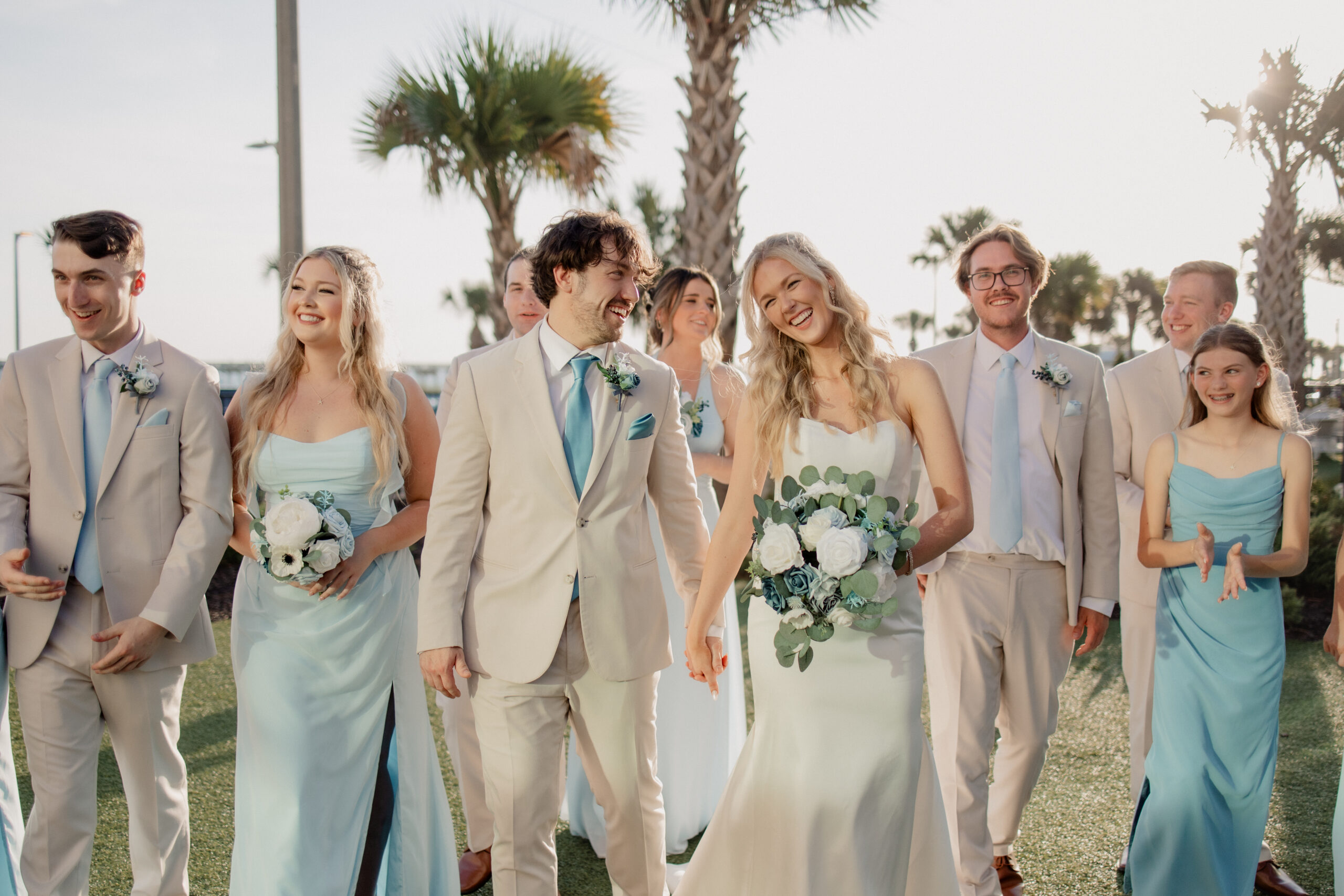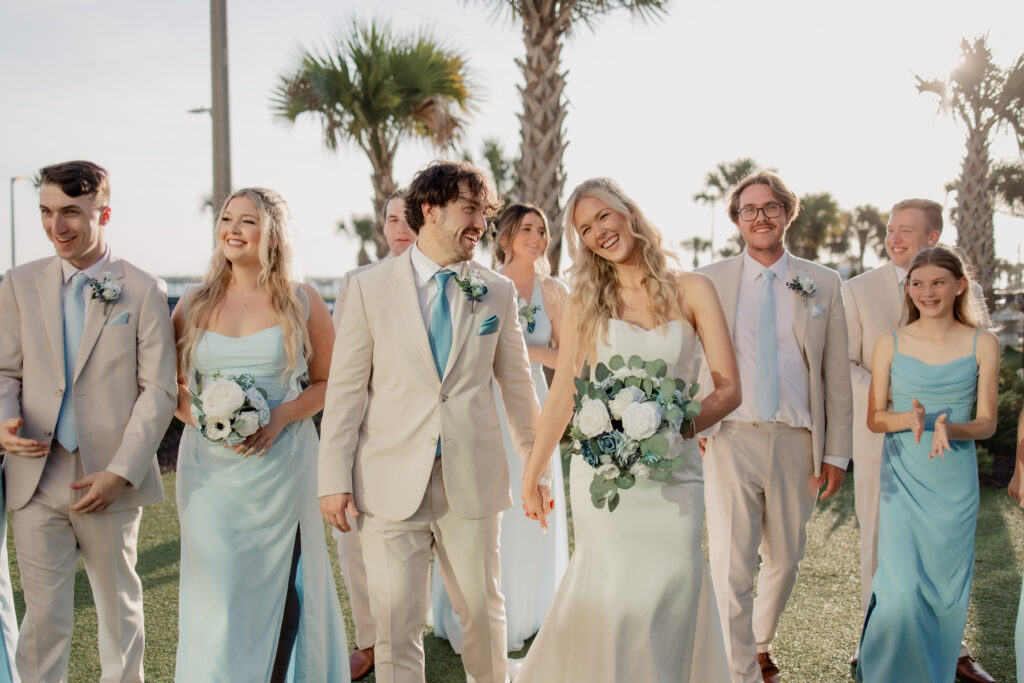
True Cost and Value of Luxury Wedding Photography and Videography on the Gulf Coast of Florida
What Is the “Average” Cost, Really?
Planning your wedding in Destin, 30A, or anywhere on the Gulf Coast? One of the first questions couples ask is: “How much does wedding photography and videography really cost?” You’ve probably seen numbers like $2,500–$3,000 tossed around online, maybe even professionals charging upward of $9,000-$10,000, but the truth is, the “average cost” doesn’t tell the whole story. Let’s break down what you can expect at different price levels—and what kind of value each tier actually delivers.
A large national survey found couples spent about $2,900 on their wedding photographer on average. theknot.com. Wedding industry sites often say typical U.S. photographer rates range from around $1,150 up to $3,000, with the average hovering near $2,000. weddingwire.com.
However, that average can be misleading. It lumps together everyone from brand-new beginners to ultra-luxury professionals. In reality, wedding photography prices vary wildly based on the photographer’s experience, skill, location, and what’s included. So while “around $2,500” might be a rough middle-ground nationally, it doesn’t mean $2,500 guarantees a particular level of quality or service. As one luxury photographer put it, “Places like The Knot say one thing while others say something else… price ranges vary and that’s normal” laurenbakerphoto.com. In other words, the context behind the price matters tremendously.
Instead of asking “What’s the average cost?”, a better question is “What do I really want from my wedding photos and video, and what level of professional will deliver that?”. Once you frame it that way, you can understand what value you get at different price points. Let’s break down those differences so you can decide how much you should invest for the experience and results you truly want.
Price Tiers: From Cheap Hobbyists to Luxury Pros
Not all wedding photographers (or videographers) are created equal. Here’s a rough breakdown of price tiers in the wedding photography market and what you can expect at each level:
- $0 – $1,000: “Amateurs” (Not Recommended) – At the rock-bottom end are newbies or hobbyists who may shoot a wedding for a few hundred bucks or even free. Typically, these are inexperienced folks building a portfolio. Hiring a photographer under $1,000 is very risky – they’re learning on your wedding. They likely lack backup gear, may struggle with timelines or tricky lighting, and some even flake out on couples last-minute filmandframe.com. (We’ve all heard the horror stories of a “friend with a nice camera” who forgot the wedding date!) Unless you truly have no budget, it’s often safer to avoid the under-$1k tier.
- $1,000 – $2,000: “Budget” Photographers – In this range you’ll find beginners with a little experience or part-timers. They might have shot a few weddings and can pull off the basics. Many are still developing their style and may use entry-level gear. You can certainly find a decent up-and-coming photographer around $1.5k, but understand you’re likely getting someone who’s still refining their craft. They may not consistently deliver the polished, storytelling images that a more seasoned pro would. Proceed with caution and vet them thoroughly – ask to see full galleries, inquire about backups and contingency plans, etc… Some couples do find “hidden gems” here, but be aware of the trade-offs in experience.
- $2,000 – $4,000: Mid-Range Professionals – This is where a huge portion of wedding photographers fall. By around $2-3k, many photographers have decent experience and portfolios; some may still be part-time but investing in better gear and education. You’ll often get solid quality and a good experience at this level, especially toward the higher end of the range. Think of these as the “growing professionals” – they’ve shot numerous weddings and are delivering consistently nice images. For couples on a tighter budget who still want quality, this tier can be a sweet spot. Just keep in mind they might not have the ultra-refined style or extensive client services that come with top-tier vendors.
- $4,000 – $6,000: Established Full-Time Pros – In this range you’re looking at experienced, full-time wedding photographers who have spent years honing their craft. These photographers usually have a strong demand for their work and a well-developed artistic style. Crucially, they also focus on providing a top-notch client experience – from timeline planning to helping you feel comfortable and stress-free on the big day. At $4k+, you should expect high-quality images AND professionalism that removes a lot of wedding day worry. This is the level we highly recommend if you deeply care about your wedding photos and want peace of mind. In fact, many reputable studios (like our own White Sands Weddings team) operate in this range for local weddings, because it allows us to deliver the quality and experience couples deserve.
- $6,000 – $10,000: Luxury & Destination Photographers – Once you venture above roughly $6k, you’re entering the realm of luxury wedding photography. These photographers often cater to high-budget, large-scale events or destination weddings. Many start around $6k and up, with some top artists charging $8k, $10k or more for full-day coverage peytonhelmproductions.com. What do you get for this premium? Typically, a photographer with 10, 15, or 20+ years of experience, a distinguished artistic style, and the ability to handle high-profile or logistically complex events with ease. They might take on only a limited number of weddings per year, giving you extremely personalized service. If you’re hosting a multi-day wedding extravaganza or a destination affair, this level of expertise can be worth every penny. It’s not unusual for top destination photo or video specialists to charge $5,000-$15,000+ for their comprehensive coverage filmandframe.com. (And yes, there are even celebrity photographers who command $20k+ for those with no budget cap!)
- $10,000+ : The Ultra-High-End – Once in a rarefied tier above $10k, you’re likely dealing with world-class photographers or teams. These are folks who might shoot luxury events worldwide or have a brand name in the industry. For example, an “ultra-experienced” photographer with 20+ years in luxury weddings might start around $20,000 laurenbakerphoto.com. This tier is beyond what most couples need, but it’s out there. If budget truly isn’t a concern, you can absolutely find top artists whose work is renowned (and priced accordingly).
Keep in mind these ranges aren’t hard rules but general trends. There are always a few outliers – e.g. a newer photographer with amazing talent might charge $3k, or a long-time pro in a lower cost-of-living area might price around $2k. But generally, you get what you pay for in this industry. The more you invest, the greater the experience, reliability, and artistry you are likely to receive. filmandframe.com On the flip side, at the lower end, the risk to your wedding memories is much higher if something goes wrong.
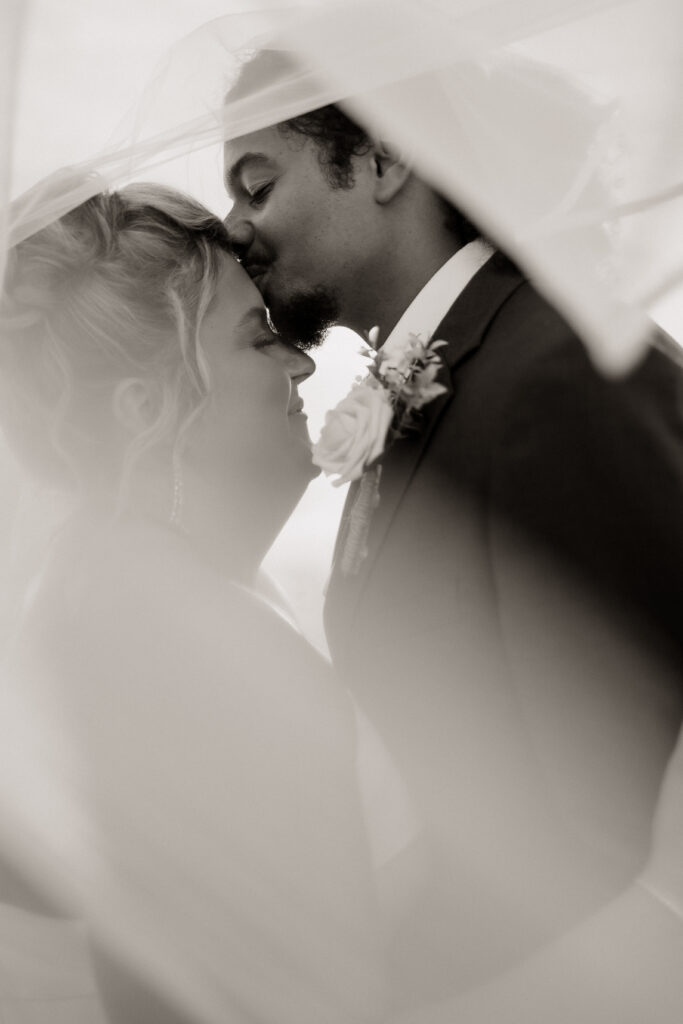
Why Do Some Photographers Charge So Much?
At first glance, it can be puzzling why one photographer is $2,000 and another is $8,000+ for what “appears to be the same service”. The truth is, a lot of behind-the-scenes factors drive those price differences. When a professional photographer charges a premium rate, here’s what you’re often paying for:
- Time & Labor (Not Just on Wedding Day): Shooting the wedding is only a fraction of the work. For every hour capturing photos, a photographer can spend 3-4 hours editing and culling images afterwards. An 8-hour wedding might easily mean 30+ hours of meticulous post-production work. Your photographer is curating hundreds (or thousands) of shots, perfecting the color and exposure of each keepable image, and assembling your gallery or album. This post-processing labor is invisible to clients but significant – hence it’s built into the cost. (One videographer noted that an 8-hour wedding day could translate to 40+ hours of total work once editing the film is included – it’s a massive time investment per wedding.)
- High-End Equipment & Backup Gear: Professional camera bodies, multiple lenses, lighting equipment, memory cards, drones, audio gear – it adds up fast. Top wedding photographers often bring $20,000-$100,000 worth of gear to a single wedding. They’ll have backups for everything – spare cameras, extra flashes, multiple lenses – so that if any piece of gear fails, your wedding coverage doesn’t miss a beat. That built-in redundancy protects your images but is costly to maintain (think repairs, replacements, insurance). Part of a photographer’s fee goes toward acquiring and caring for this pro-grade equipment. As one fine art photographer shared, “I arrive at each wedding with a minimum of $100,000 of equipment. I also have backups to every piece. After every three weddings, I send all my cameras and lenses for professional cleaning” theknot.com. You’re investing in their tools and reliability.
- Experience & Expertise: Wedding photography is as much about know-how as it is about cameras. A seasoned pro has likely shot hundreds of weddings and can handle any curveball – dim church lighting, sudden rain, timeline delays, family drama – with calm and skill. This experience means better problem-solving, fewer mistakes, and the ability to still create gorgeous images under tough conditions. It also means they understand the flow of a wedding day intimately and can help guide your schedule so everything runs smoothly. All that expertise comes from years of learning (often through mistakes early on!). So you’re paying for the confidence and peace of mind that comes with an experienced shooter who won’t be fazed by anything. As one writer quipped, with an experienced vendor “you’re not just hiring a person with a camera, you’re hiring an artist who can handle whatever the day throws at them”. That assurance is worth its weight in gold for your once-in-a-lifetime day.
- Second Shooters & Staff: When you see a package for $5,000+, it often includes not just one photographer but a team. Most established photographers hire a second shooter (or even a third) to help cover different angles and moments. Having a second photographer means while one is capturing the bride walking down the aisle, the other can snap the groom’s teary reaction; or one covers cocktail hour candidly while the other sets up detail shots of the reception décor. This fuller coverage yields a richer gallery of images for you, but of course the second shooter’s time must be paid. Many top photographers also bring an assistant to handle lighting, gear changes, or organizing people for group shots. All these extra hands ensure no moment is missed and things run efficiently – but they do add to the total cost. (On the flip side, a solo operator charging $1k simply can’t provide that same depth of coverage or service.) As an example, one veteran noted “most pros work with at least one second shooter, which adds to cost but hugely enhances the variety of images captured” theknot.com. In short, part of the fee goes to paying a competent team to serve you.
- Editing & Production Costs: We touched on the time required for editing; in addition, photographers invest in specialized software and systems. From Adobe Lightroom/Photoshop subscriptions to online gallery hosting services, album design software, high-speed storage drives – these are the tools of the trade. One photographer pointed out she pays for over a dozen different software subscriptions and services, which ran about $2,400 per year. These overhead costs (plus things like high-end computer equipment to handle 4K video or huge image files) are built into professional pricing. Quality post-production isn’t just time-consuming, it also requires keeping technology up-to-date.
- Business & Legal Expenses: Unlike a hobbyist who shoots on weekends for extra cash, a legitimate full-time wedding photographer is running a real business. That means they have expenses like liability insurance (protecting you and them in case of accidents), equipment insurance, license fees, advertising/marketing costs, taxes, possibly studio rent or storage, travel expenses, etc. For example, if your wedding requires them to fly out or stay overnight, those travel costs get factored in (either as part of the package or as an added fee). Even locally, driving a few hours might incur mileage charges. The more experienced (and in-demand) the photographer, often the more business overhead they carry as well, which influences pricing. And yes – professionals also deserve to earn a living wage from this highly demanding job! They’re not just showing up for 8 hours on Saturday; they’re dedicating many days to your wedding and running a business year-round. Their pricing reflects all of that commitment.
- Deliverables & Product Quality: What’s included in a package will affect the price. Do you get an engagement shoot as part of the deal? An heirloom wedding album or printed photos? Extra hours of coverage, a next-day sneak peek, a highlight slideshow? All these add-ons bring value but also cost the photographer time and materials. For instance, a beautiful handcrafted album can cost a photographer several hundred dollars to produce through a professional lab (which uses archival inks and papers far superior to consumer prints). If a package includes one, naturally the price is higher than a package of just digital files. Same goes for things like a longer edit of your wedding film, additional USB drives of videos, etc. More hours of coverage will also raise the fee – a 6-hour basic package might suffice for a simple wedding, but if you need 10-12 hours to cover getting ready through the grand exit, expect to pay more for that extended time. In short, premium packages that deliver more goodies (albums, parent books, multiple edited videos, etc.) will be priced higher. They offer amazing keepsakes – just remember that behind each item is work and cost that the studio absorbs.
- Market Location Differences: Wedding photography prices reflect local economies too. Where you get married can significantly impact pricing. For example, photographers in major metropolitan areas (think NYC, Los Angeles, DC) often charge 40-60% above the national average due to higher costs of living and demand. wezoree.com Meanwhile, talented photographers in smaller towns or less expensive regions may charge less than the national average and still make a good living. Even within Florida, for instance, a Destin or 30A wedding photographer might cost more than one in a smaller Gulf Coast town. Also, if you’re planning a destination wedding or elopement that requires a photographer to travel out of their home area, they’ll factor in travel time, airfare, lodging, and even extra preparation into the price. Always consider the location factor: a $5k package in one city might equate to a $3k package elsewhere purely due to economics, not necessarily a difference in quality.
With all these factors, it starts to make sense why a true professional charges what they do. You’re not just paying for “8 hours of work” – you’re investing in expertise, reliability, extensive labor on your images, and the assurance that one of the most important days of your life is documented beautifully and safely.
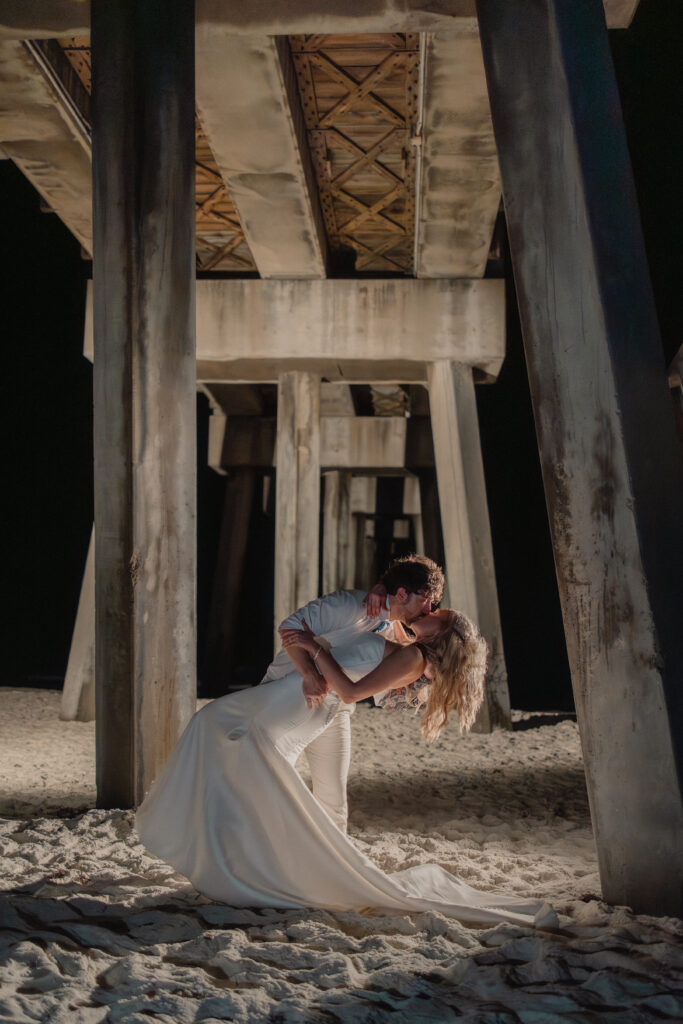
What About Wedding Videography Costs?
Let’s not forget video. Many couples today want a highlight film or full wedding video to relive the vows, speeches, and emotions in motion. How much does a wedding videographer cost?
A great wedding videographer – especially one who creates a cinematic, storytelling film – can charge just as much as a great photographer, if not more. In fact, some experts predict videography prices may soon overtake photography as the effort and artistry involved in crafting a film become more appreciated. Think about it: a videographer also works long hours on editing (most likely even more hours than photographers for a polished film), and needs high-end cameras, microphones, and editing tools. Capturing live audio (your vows, music, etc.) and stable footage is a whole different challenge. So while the entry point for video might be a bit lower right now, top-tier videography is absolutely an equal investment.
If you’re considering both photo and video, there’s good news: hiring a team that offers combined photo + video packages can often save you some money and make your life easier. Here at White Sands Weddings, we do both photography and videography as one coordinated team, and we’re not alone. Many studios offer bundle deals. Typically, couples save around 10-20% by booking photo and video together in a single package. Why the savings? From the vendor’s side, there are some efficiencies in planning and overhead when one company handles both. We pass that on to you. As an example, imagine a photographer charges $4k and a videographer $4k separately (total $8k), but a combined team might offer the duo for $6k – you just saved $2,000!
Beyond cost, a photo/video team brings other perks:
- One Contact, One Contract: You’re dealing with a single company for both services, which means far less coordination hassle. One planning meeting covers both photo and video needs. You sign one contract and pay one retainer instead of juggling two. This consolidation can be a huge stress reducer in wedding planning – fewer emails, fewer invoices to pay, and a cohesive approach to your day’s coverage.
- Built-In Teamwork: A dedicated photo-video team works together regularly, so they know how to coordinate shots seamlessly. There’s no ego clash of two separate vendors each doing their own thing. Instead, say during the first look, the photographers and cinematographers already have a plan to avoid getting in each other’s shots and to capture both stunning photos and video footage. The result is a more efficient and harmonious experience for you. It also means the style of your photos and film can feel cohesive since the team likely has a unified vision.
- Fewer People Around You: This is a benefit couples don’t always consider. If you hire separate vendors, you might have a crew of 2-3 photographers and 2-3 videographers all buzzing around you on the wedding day. That could be 5 or 6 cameras in your face at once, which can be overwhelming. A combined team can often streamline the personnel. For example, at White Sands Weddings, we typically send a team of two or three total when doing both photo and video – often it’s just two of us doing double-duty, or an extra hand if needed. Compare that to potentially double the headcount with separate companies. Fewer strangers following you around = a more intimate, relaxed day for you and your guests.
- No Compromise on Quality: Worried that one team can’t do both well? A skilled photo/video team won’t sacrifice quality on either side. We make sure to staff appropriately (e.g. a third shooter if needed) so that neither photos nor footage suffer. In fact, many couples are amazed that with a tight team we deliver hundreds of stunning photos and a beautiful film without missing a beat. It helps that we’re in sync and can anticipate each other’s next move. The key is choosing a team with a proven track record in both mediums – review their photo galleries and video reels. When done right, you truly get the best of both worlds in one package.
Finally, an often overlooked benefit: if, heaven forbid, something were to happen to one of your shooters (illness, emergency, etc.), a company that offers both services likely has a larger network of backup team members on call. We certainly do – having multiple team members means we can cover each other. So that’s an extra layer of insurance for your wedding memories that you might not get when hiring two totally independent freelancers.
In summary, if video is important to you (and we highly recommend it – nothing captures the vows, toasts, and laughter like a film!), it’s worth looking into a combo Photo+Video package. You’ll often save money, reduce stress, and get a well-oiled team that delivers everything together.
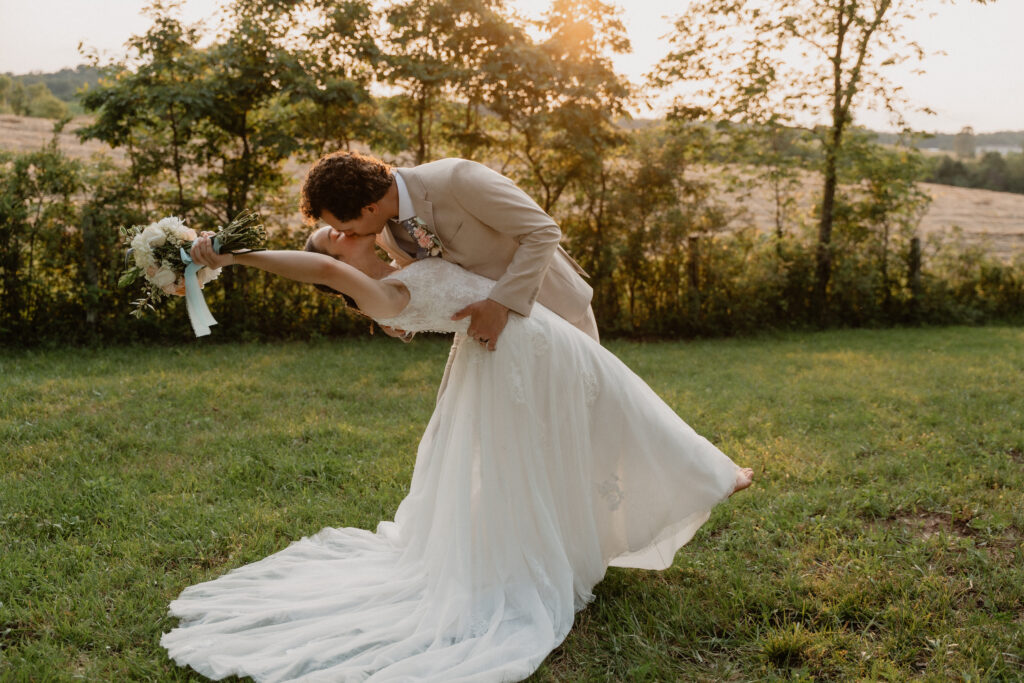
How Much Should You Budget for Photo & Video?
Now for the big question: given all this, how much should you plan to invest in wedding photography and videography for your wedding? The answer will depend on your priorities and wedding specifics. Here are a few guidelines and thought exercises:
1. Consider How Important Photography/Videography Is To You. Some couples feel that capturing the day is one of the most crucial aspects – after all, when the day is over, the photos and videos are how you’ll revisit those memories for a lifetime. Other couples may rank it a bit lower behind things like venue or catering. There’s no wrong answer, but be honest with yourselves. If having stunning photos and a cinematic film is a top priority, allocate more budget to it. Industry experts often suggest dedicating around 10-15% of your total budget to photo and video. This is just a rule of thumb – not a must. In fact, if photography is the most important thing to you, you might allocate an even higher percentage. Conversely, if you truly just want basic documentation, you might spend less. The key is that your budget for this should align with how much you value it, not some arbitrary number. Don’t feel tied to the old “10% rule” if it doesn’t fit your vision.
2. Factor In Your Wedding Style and Size. The type of wedding you’re having can influence how much coverage you need. A large formal wedding with 300 guests and a full-day itinerary will likely require more hours (and possibly additional shooters) than a small 2-hour elopement. Here’s a general breakdown for different scenarios (assuming you do care about getting great imagery):
- Intimate Elopements or Courthouse Weddings: If you’re eloping on a beach, in the mountains, or having a short city hall ceremony with just a few witnesses, you might only need 2-4 hours of coverage. For a meaningful elopement in the U.S., couples who prioritize photography often invest roughly $2,000 – $5,000 for an experienced shooter. (possibly on the lower end if local, higher if travel is involved). If you want a video of your elopement, expect a bit more on top or find a photo+video bundle that covers it. Many photographers offer special elopement packages at lower cost than full weddings, but remember you’re often hiring one of those higher-tier folks (because you still want amazing photos, just for fewer hours).
- “Standard” Local Weddings (100-ish guests, single-day event): For a traditional wedding day in your home city/town, where you really want high-quality photos and a smooth experience, a good rule of thumb is plan on $3,000 – $6,000 for photography. This would correspond to that mid-range to professional tier. If you’re aiming for a well-established photographer in a moderately priced region, you might land around $4-5k. Adding a videographer of similar caliber could be another ~$4k-$5k if separate, or consider a combined package around $6,000 – $12,000 total for both. Yes, that’s a significant portion of most wedding budgets, but couples who have gone this route rarely regret investing in quality.
- Luxury or Destination Weddings: If you’re planning a high-end wedding (perhaps at a luxury venue or a multi-day celebration) or a destination wedding overseas, photography/videography will understandably be a larger line item. For a large luxurious event or international destination, couples serious about their images should expect to spend around $5,000 – $15,000 on photography, and a bit more if you want a top-notch video as well. Travel fees may be additional if your chosen photographer/videographer isn’t waiving them. At this level, you’re often hiring someone who’s a true expert and maybe flying them in, so costs can vary widely. It’s not unusual for some destination weddings to allocate $10k+ for an elite photo+film team to travel and cover multiple days. The upside? You will get breathtaking imagery in an epic location, captured by someone capable of doing it justice. If that’s your dream, it’s worth the investment.
Of course, these ranges are general suggestions. Every wedding is unique. If your budget is fixed and it’s lower, you can still find options – just may require more research and perhaps compromising on experience level. If your budget is higher and photography is your passion, you could go all out on a top-tier artist. The goal is to balance your budget with your expectations.
3. Consider Value-Adds and Long-Term Value. When comparing packages, look at what’s included. One photographer’s $5,000 quote might actually be more valuable than another’s $3,700 quote if the first includes an engagement session and a 10×10 leather album and the second is for coverage only. Think about whether you’ll want prints or an album – it can be nice to bundle those upfront rather than scrambling to make one after the wedding. Also, consider the long-term value: your wedding imagery is truly a lifelong keepsake. Years down the road, you likely won’t care that you spent a few hundred extra to get the right photographer, but you will care every time you open your album that the photos are gorgeous and bring back the feelings of the day. Couples consistently find that their photos and videos become more priceless to them over time, long after the big day. It’s an investment not just for the day-of, but for decades of memories.
4. Ask About Payment Plans or Off-Peak Discounts. If you’ve found your dream photographer and they’re a bit out of budget, don’t immediately write them off. Many photography studios (ours included) can be flexible with payment plans. For example, splitting the fee into a monthly payment plan leading up to the wedding can make a higher-end option more attainable. It never hurts to ask. Also, if you’re having an off-season or non-Saturday wedding, some photographers offer discounts for those dates. A Friday winter wedding might cost less than a Saturday in June with certain vendors. These little adjustments can sometimes bridge the gap and let you get the quality you want within your means.
In the end, how much you spend on photography and videography is a personal decision. But hopefully now you’re armed with a clearer understanding of what goes into the cost and why investing in experienced professionals pays off. If budget is a concern, prioritize what matters most to you (e.g., maybe hire a great photographer for images and skip video, or vice versa, or get a shorter coverage package from an excellent team rather than all-day coverage from a mediocre one). There’s no one-size-fits-all answer, but there is an optimal solution for you once you weigh quality, cost, and value.
Final Thoughts: Investing in Your Memories
How Much Should You Spend on a Wedding Photographer in Florida?
Couples in Florida—especially in Destin and 30A—often spend between $4,000 and $6,000 for experienced, full-time wedding photographers. This range reflects not just the hours of coverage, but the expertise, gear, and peace of mind that comes with hiring a seasoned professional.
Is Wedding Videography Worth It?
Absolutely. Photography freezes moments in time, but videography lets you relive them—the vows, the music, the laughter. Think of it this way: decades from now, your film will be how your children and grandchildren hear your voices and see your love in motion.
The food will be eaten, the music will fade, the flowers will wilt… but your photos and videos will remain. They become the tangible memories you’ll treasure, share with loved ones, and perhaps show your kids and grandkids one day. That perspective is why we encourage couples to invest as much as comfortably possible in a photographer/videographer whose work they love and trust. Skimping in this area can be a regret later (“Why didn’t we get more photos of ___?” or “I wish the video had audio of our vows…”). On the flip side, going with a seasoned pro means peace of mind on your wedding day. You get to be fully present, confident that every tear, every laugh, every sunset kiss on the beach is being artfully captured.
At White Sands Weddings, we believe your wedding day is too important to gamble on. That’s why couples across the Gulf Coast including Destin, 30A, and Panama City Beach trust us to deliver both luxury photography and cinematic films—an investment in memories that last forever.
In summary: The “average cost” might be around a few thousand dollars, but your wedding is anything but average. Figure out what level of photography/videography will make you happiest, do the research, and invest in the best you can comfortably afford. Years from now, you’ll be so grateful that you did. Here’s to capturing your day in living color – and to making an investment in memories that will last a lifetime. Cheers!
Curious what your day could look like? Take a look at some of our recent films and galleries to see how we bring memories to life.
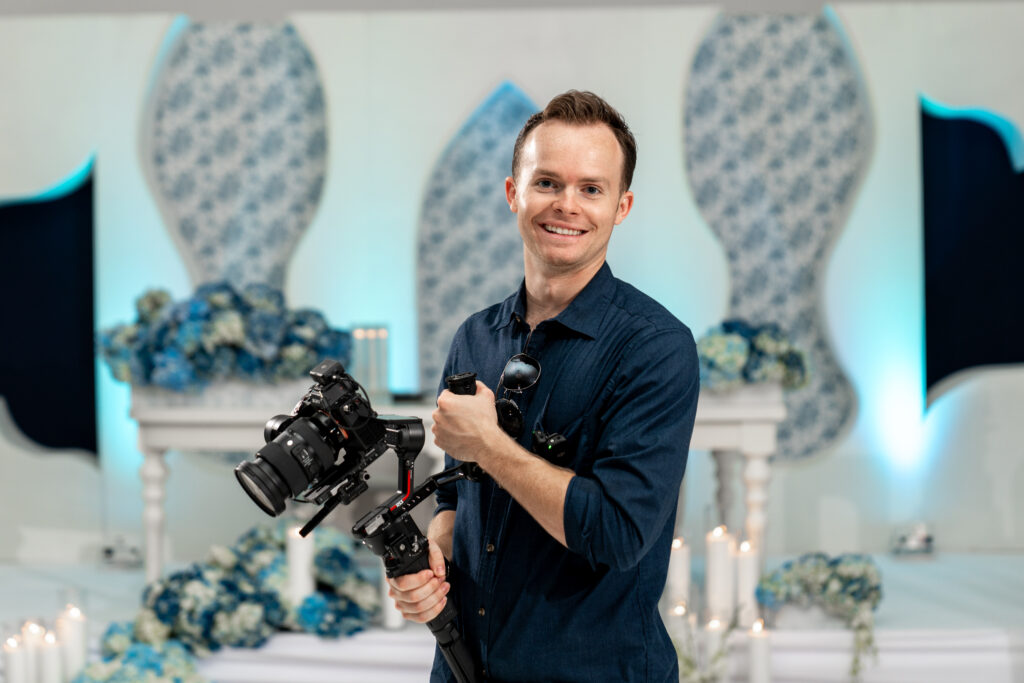
Matthew Oakes
Founder & Filmmaker, White Sands Weddings
info@whitesandsweddings.com
